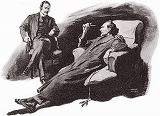It was late that evening before I returned to Baker Street and gave an account of my mission. Holmes lay with his gaunt figure stretched in his deep chair, his pipe curling forth slow wreaths of acrid tobacco, while his eyelids drooped over his eyes so lazily that he might almost have been asleep were it not that at any halt or questionable passage of my narrative they half lifted, and two gray eyes, as bright and keen as rapiers, transfixed me with their searching glance.
“The Haven is the name of Mr. Josiah Amberley’s house,” I explained. “I think it would interest you, Holmes. It is like some penurious patrician who has sunk into the company of his inferiors. You know that particular quarter, the monotonous brick streets, the weary suburban highways. Right in the middle of them, a little island of ancient culture and comfort, lies this old home, surrounded by a high sun-baked wall mottled with lichens and topped with moss, the sort of wall- -”

“Cut out the poetry, Watson,” said Holmes severely. “I note that it was a high brick wall.”
“Exactly. I should not have known which was The Haven had I not asked a lounger who was smoking in the street. I have a reason for mentioning him. He was a tall, dark, heavily moustached, rather military-looking man. He nodded in answer to my inquiry and gave me a curiously questioning glance, which came back to my memory a little later.
“I had hardly entered the gateway before I saw Mr. Amberley coming down the drive. I only had a glimpse of him this morning, and he certainly gave me the impression of a strange creature, but when I saw him in full light his appearance was even more abnormal.”
“I have, of course, studied it, and yet I should be interested to have your impression,” said Holmes.
“He seemed to me like a man who was literally bowed down by care. His back was curved as though he carried a heavy burden. Yet he was not the weakling that I had at first imagined, for his shoulders and chest have the framework of a giant, though his figure tapers away into a pair of spindled legs.”
“Left shoe wrinkled, right one smooth.”
“I did not observe that.”
“No, you wouldn’t. I spotted his artificial limb. But proceed.”
“I was struck by the snaky locks of grizzled hair which curled from under his old straw hat, and his face with its fierce, eager expression and the deeply lined features.”
“Very good, Watson. What did he say?”
“He began pouring out the story of his grievances. We walked down the drive together, and of course I took a good look round. I have never seen a worse-kept place. The garden was all running to seed, giving me an impression of wild neglect in which the plants had been allowed to find the way of Nature rather than of art. How any decent woman could have tolerated such a state of things, I don’t know. The house, too, was slatternly to the last degree, but the poor man seemed himself to be aware of it and to be trying to remedy it, for a great pot of green paint stood in the centre of the hall, and he was carrying a thick brush in his left hand. He had been working on the woodwork.
“He took me into his dingy sanctum, and we had a long chat. Of course, he was disappointed that you had not come yourself. ‘I hardly expected,’ he said, ‘that so humble an individual as myself, especially after my heavy financial loss, could obtain the complete attention of so famous a man as Mr. Sherlock Holmes.’